How To Become A WordPress Contributor

We’re not ashamed to admit it.
We freakin’ love open source!
Open-source software encourages collaboration, transparency, and inclusivity in the website creation world — something that we need more than ever now that most of the digital community is based behind far-flung computer screens.
WordPress, the behemoth that powers 43% of the internet’s websites, is the ultimate open-source project.
That’s why we’re obsessed with WordPress, too!
WordPress is an open-source platform developed and maintained by a dedicated community of contributors made up of awesome people like me and (soon) you!
Becoming one of these stalwart WordPress contributors and shaping the future of the platform is easier than you might imagine. Plus, there are many excellent avenues for contributing. Along with the obvious coding and development roles, you can get involved in design, translation, community outreach, photography, and more.
So let’s first talk about what contributing to WordPress actually means and why you should do it. Then, we’ll walk you through the step-by-step process of finding your niche and jumping into the community.
(Note: WordPress.com & WordPress.org are different! WordPress.org is free, open-source software that anybody can use to create a self-hosted website. WordPress.com is a site-building and hosting platform from for-profit company Automattic. The basics are free, but there are plenty of paid upgrades. This article is all about WordPress.org. OK, back to it!)
What Is A WordPress Contributor?
Funnily enough, “WordPress contributor” has more than one meaning.
For people who run their websites on WordPress, the term may already be familiar. It’s the name of one of the core user roles. Inside a WordPress installation, a contributor is someone with permission to log in and edit or delete their own blog posts, but not publish anything or make any changes to others’ posts.
User Roles
Users in WordPress can be one of five default roles: Administrator, Editor, Author, Contributor, or Subscriber. WordPress provides a user role management system that defines what users are allowed to do on your website.
Read More
However, that’s not what we’re talking about today.
This article is all about people who actively contribute their time and skills in documentation, development, design, and more to help build and advance the user-driven, open-source WordPress project.
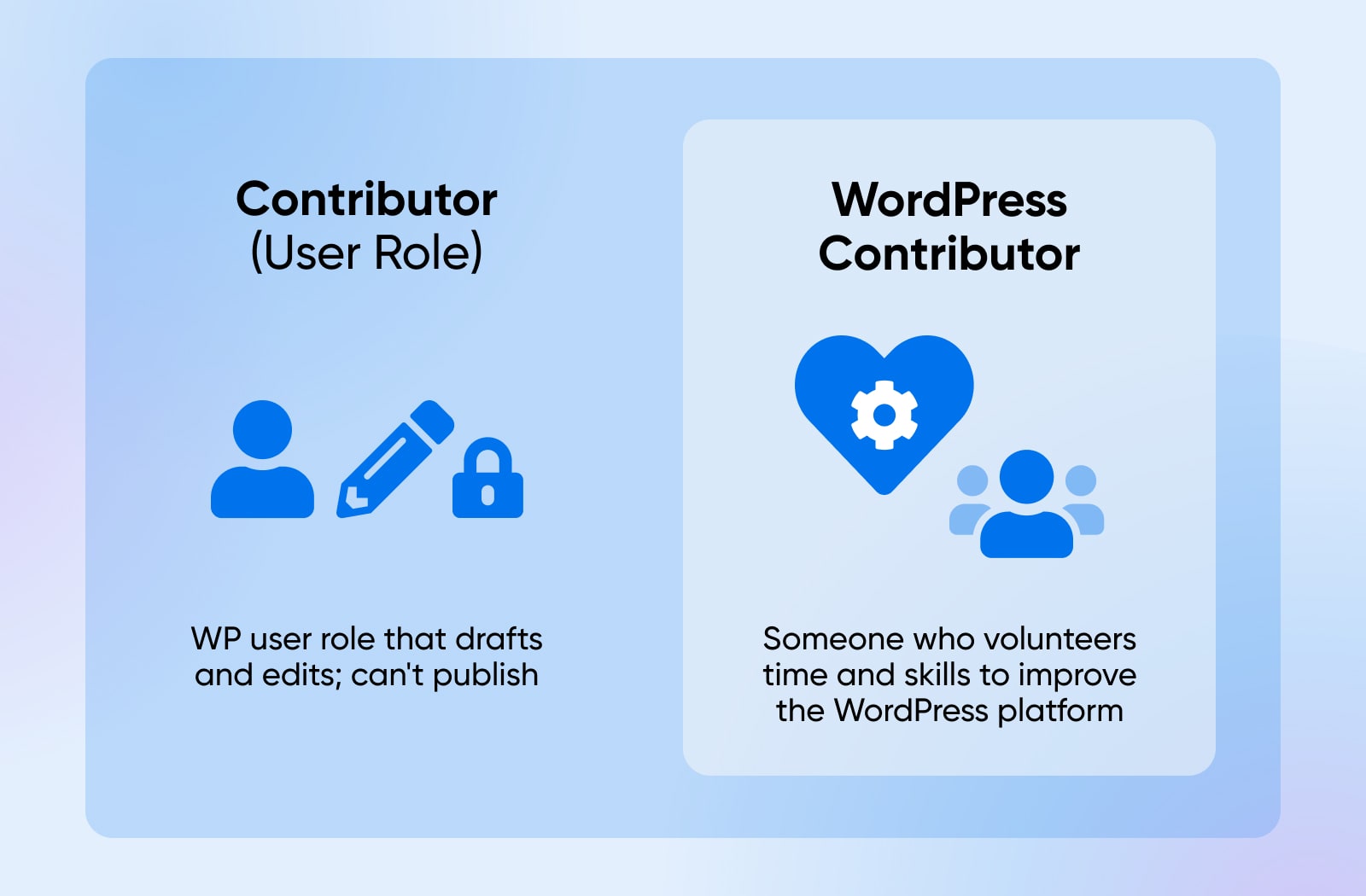
With that cleared up, let’s dive into the benefits.
Why You Should Consider Contributing To WordPress
WordPress’ community is ultimately what made it the flexible, powerful platform it is today.
As a free and open-source site builder, WordPress is totally developed and maintained by a dedicated community of users. And it relies on this community to keep it updated, add new features and functionality, provide testing and support, and much more.
Open Source
In software development, open source projects are free for anyone to download, use, modify, and distribute. WordPress is one great example of open source software, although it’s far from the only one.
Read More
Of course, you don’t need to know anything about the larger world of WordPress to use the platform for your own websites. You can literally build a WordPress website in just a few minutes.
However, it may be worth your while to get involved in the platform’s development if you’re a fan and user. Here’s why:
- You get the chance to give back to the community providing you with an invaluable resource.
- Working as a contributor helps you learn more about WordPress and other areas related to web development and design.
- It’s a perfect way to exercise or develop new skills.
- You’ll gain valuable experience, which may help you beef up your resume or attract freelance clients.
- Immersing yourself in the WordPress community enables you to connect and build professional and personal relationships with other contributors.
Altogether, there’s a compelling case for trying your hand as a WordPress contributor. What’s more, you have the flexibility to put as much or as little time into the endeavor as you’d like, and there are plenty of different ways to get involved (which we’ll explore shortly).
Get Content Delivered Straight to Your Inbox
Subscribe to our blog and receive great content just like this delivered straight to your inbox.
How To Become A WordPress Contributor (3 Easy Steps!)
Just like when you walk into a real-life party, you’ve got to find your place in the WordPress herd, whether it’s on the development dance floor or hashing out ideas with the community-building crowd in the kitchen (where the snacks are!).
Regardless of your particular niche and skill set, these three steps can help you start off on the right foot as a WordPress contributor.
1. Research WordPress And Its Community
Whether you’re a relative noob or you’ve been using WordPress for years, learning more about the platform and its community is a smart first step.
Why?
For one, you’ll need more in-depth knowledge about WordPress as a contributor than you ever did as a user. Plus, spending some time immersed in WordPress can help you figure out where you’ll fit into the picture.
Start out by reading up on (or watching) the history and development of WordPress. This will provide you with a solid grounding in the platform’s mission and goals and will give you some idea of how far it’s come over time. WordPress has followed a long road from its beginning as simple blogging software to its current iteration as a multifaceted content management system (CMS), and there have been plenty of twists and turns along the way.
Content Management System (CMS)
A Content Management System (CMS) is a software or application that provides a user-friendly interface for you to design, create, manage, and publish content.
Read More
Once you have a better sense of how the platform came to be and the ways it’s changed since its inception, you can begin to learn more about its present-day form, focusing on whatever areas catch your interest. This step can take as much or as little time as you’d like, depending on how much you already know.
There are plenty of ways to learn about WordPress, but some excellent places to start include:
- Online courses: You can find a ton of options out there, from free half-hour tutorials to longer, more pricey options.
- YouTube videos: There’s lots of free, quality information available on YouTube, especially through channels such as WPBeginner and WPCrafter.
- Podcasts: You can tune in to your favorite podcasting app and find shows like WP Briefing, WP Minute, and the WP Podcast.
- News sources: Of course, you’ll want to keep your eye on the official WordPress.org news page. However, there are also other sites devoted to the latest WordPress happenings, such as WP Tavern and Post Status (membership required).
- Forums: The web is packed with forums devoted to WordPress in general and to specific themes, plugins, and more. Start with WordPress’ own forums and Reddit, then if you’re looking for more a simple Google search should surface further discussions.
- Blogs: There are blogs for WordPress beginners, experts, developers, and just about every niche you can think of. For example, WPMU DEV’s blog features lots of tutorials for WordPress developers. And our own DreamHost blog offers a free resource to learn much of what you’ll need to know — from simple set up and optimization tips to fixing specific WordPress errors.
Throughout the course of your research, take note of your favorite sources. You’ll want to keep visiting them over time to stay up to date and continue your WordPress education. When you feel like you have a solid understanding of WordPress and know what aspects interest you most, it’s probably time to move on to the next step.
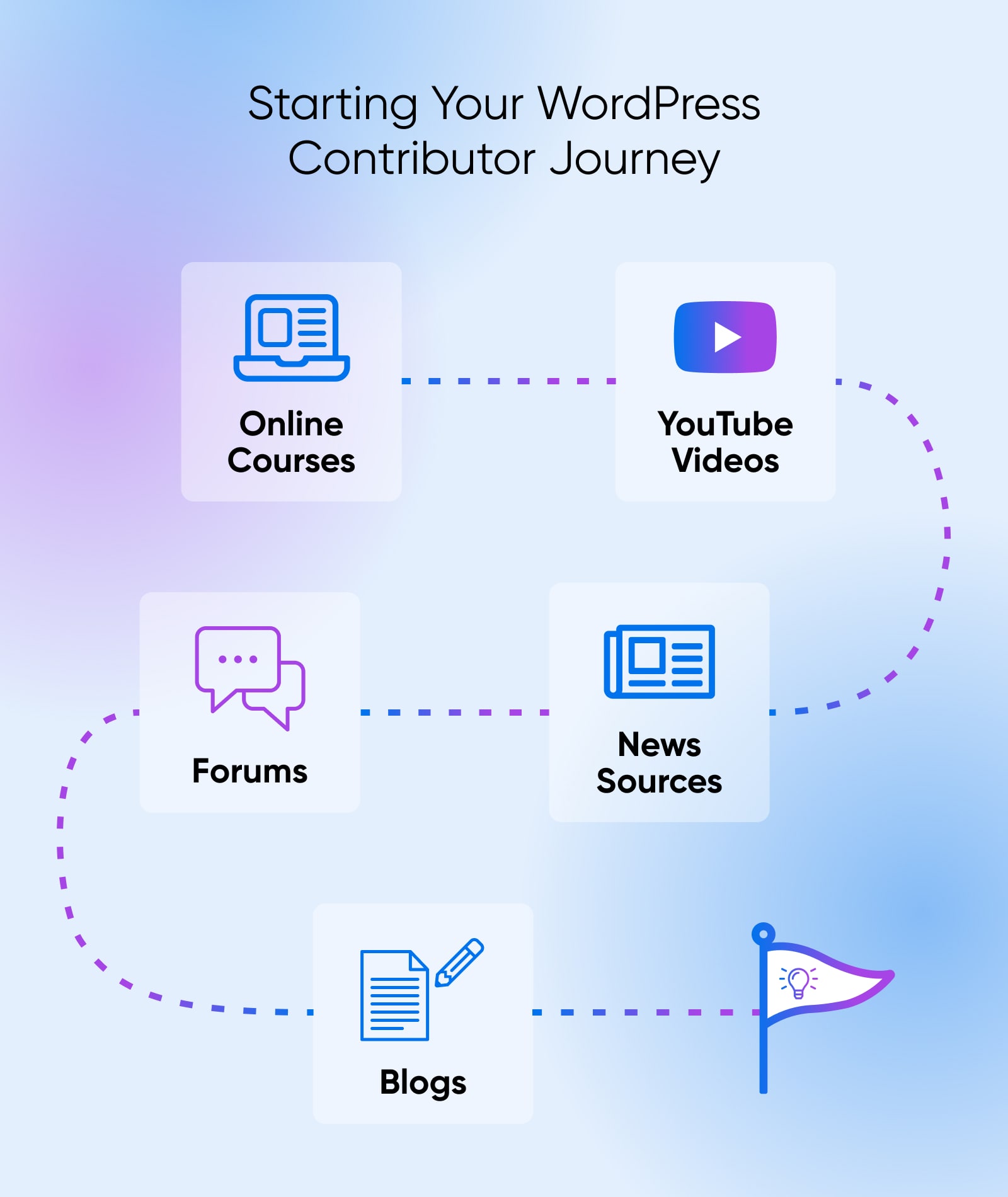
2. Choose Your Area Of Contribution
Think all WordPress contributors are developers or programmers?
Gee, stereotype much?!
Just kidding! Lots of people make this assumption.
It is true that many people in the WordPress community are developers and programmers. However, there are so many more options available when it comes to getting involved with the platform.
A project as big and complex as WordPress needs many kinds of people to keep it running. This is fortunate because it means you’re likely to find an area of contribution perfectly suited to your personal skill set and goals. Whether you’re interested in design, writing, or working with people, you can easily find a role to match your desires.
The research stage should have given you a few ideas for where you might fit into the WordPress community. There are a lot of options available.
Core Development And Beta Testing
This is the area that probably comes to mind first when you think about WordPress contributors.
Plenty of coders are required to work on the project. They’re responsible for adding new features, improving existing functionality, creating updates and patches, beta testing, and fixing bugs and other issues. Some developers stick to one or two areas of expertise, while others try their hand at just about everything.
You don’t need to be an expert or have a lot of experience, WordPress is a beginner-friendly project and has some simple ways to get you started even if you’re a relative novice. You can get your feet wet with the WordPress Beta Tester plugin, then work your way up. Plus, experienced developers are always around to help you out and answer questions.
The best place to start if you’re interested in joining the WordPress core development team is with the Core Contributor Handbook. This resource will tell you just about everything you need to know about the project’s organization, workflows, best practices, and more. Then, you can get started with some tasks earmarked for beginning contributors here, such as handling basic bugs and testing patches.
Design And User Interface
If you’re more interested in web design, you may choose to help improve the platform’s look and user interface (UI). These are key elements that impact the user experience of every person on WordPress. A solid UI streamlines the workflow for experienced users and makes their lives a little easier. And it definitely plays a major role in whether or not newcomers stick around.
WordPress’ design and UI are constantly evolving as developers and users find better ways to organize information and handle common tasks. Just as with core development, the team behind this niche is open to anyone who wants to help out. Some design experience will certainly enable you to get up and running more quickly, but you don’t need to be an expert.
There are a number of ways to start contributing to WordPress’ UI and design. You can deal with design-related tickets, work on mockups, or help out with whatever the team’s current primary focuses happen to be. Before jumping into any of these projects, check out the Design Handbook and then follow the recommended first steps for getting involved.
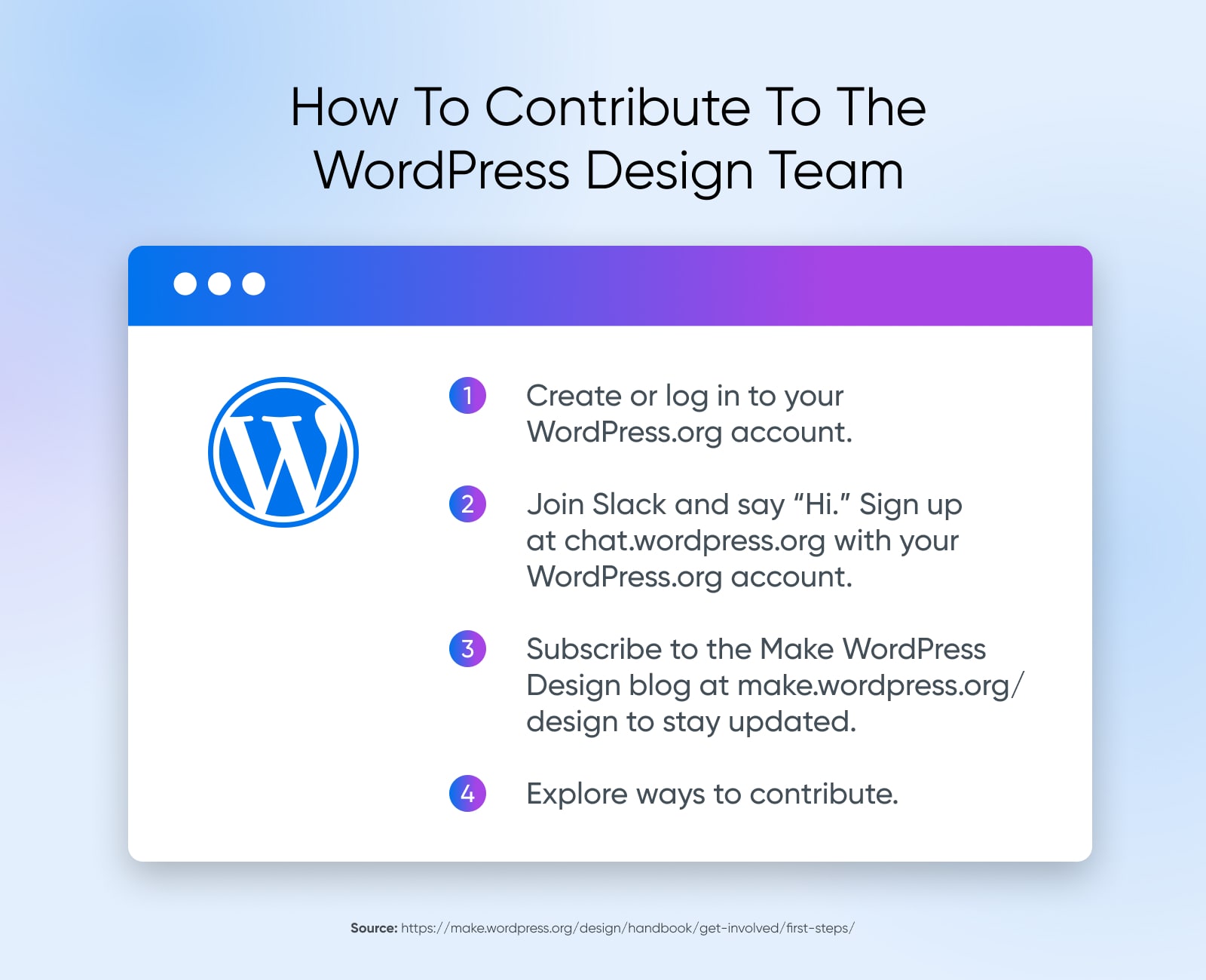
Plugin And Theme Development
This area of contribution is a little different from the rest. Developing WordPress themes and plugins isn’t exactly part of the main WordPress project, even though it’s a crucial aspect of the platform’s development. The wide availability of free and low-cost themes and plugins is a big part of what makes WordPress so popular, and what keeps it relevant year after year. Adding to that collection helps expand the CMS capabilities, so this is a vital function.
If you want to jump straight into building plugins and themes, you’ll need some experience with coding and development. If you are a complete beginner, though, you’ll simply need to spend some time beefing up your skills. Put in the effort to learn about how themes and plugins work, then start out by creating something small and simple. Let other people test the results and use their feedback to improve.
For plugin and theme development, you may want to start with a dedicated course. There are free options as well as premium tutorials from services like Udemy. You’ll also find relevant information about theme development and plugins on the WordPress site. If you run into any trouble along the way, have questions, or want to find a team to collaborate with, check out the WordPress forums. Chances are, you’ll find lots of developers there who are willing to help you out.
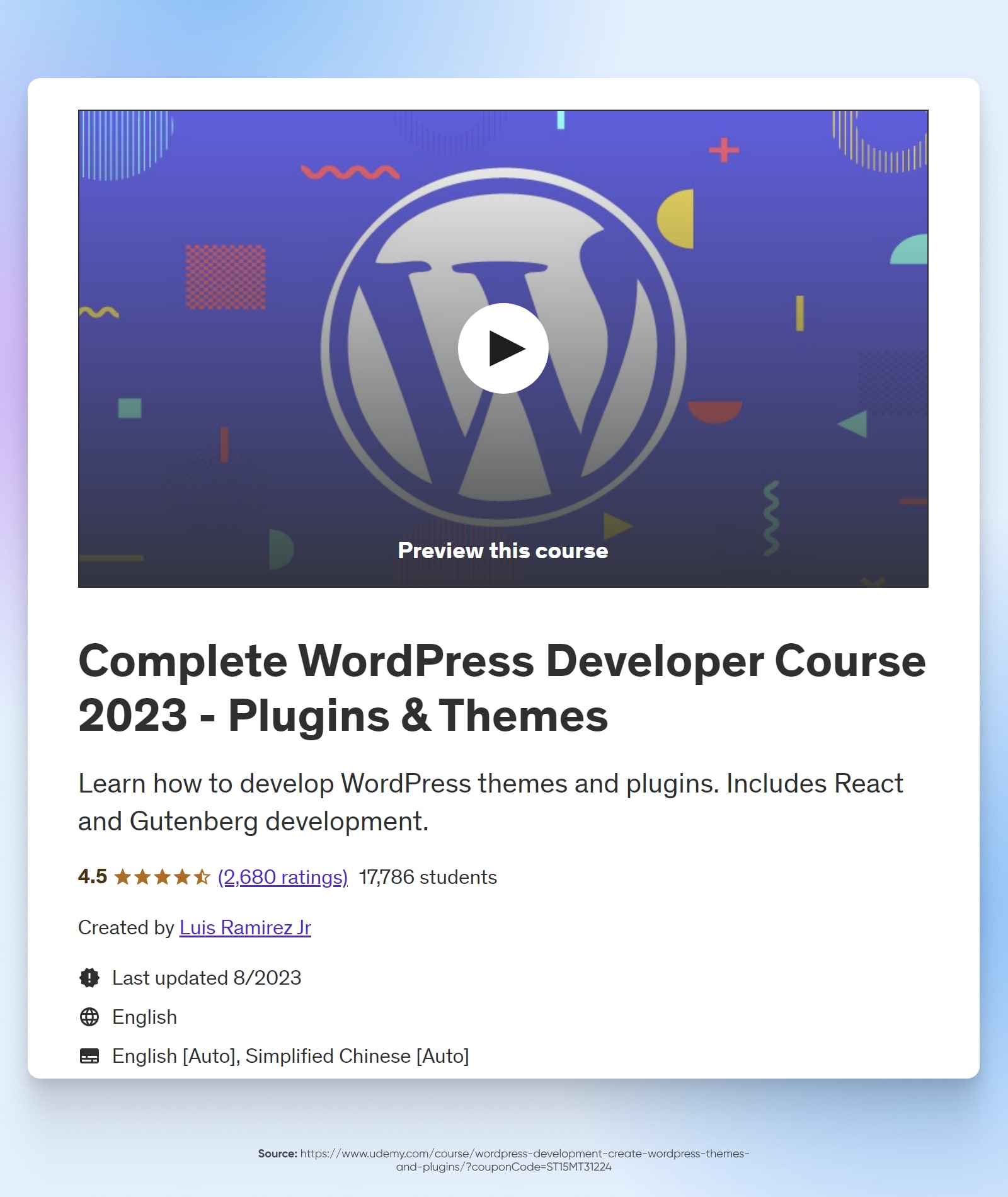
Documentation
Perhaps you’re more of a writer than a developer. Where do the word people fit in the WordPress community?
On the Documentation Team.
WordPress is a complex CMS with lots of moving parts and plenty of resources are required to teach people the ropes and keep everything straight. That means writers and editors are needed to add new content and make sure existing materials are up to date.
WordPress contributors who work on documentation are responsible for a number of projects. They add articles to the Codex and make changes to it when necessary. In addition, they work on the contributor handbooks, the WordPress developer website, and inline documentation for the platform itself. All of these resources are invaluable for new WordPress users and veterans alike, so they need to be accurate and current.
If you have some writing, proofreading, fact-checking, or editing skills under your belt, this is a perfect way to contribute to the platform. Check out the Make WordPress page for the Documentation Team on tips for getting involved.
Plugin And Theme Review
If you’re interested in working with themes and plugins, but don’t want to get involved in development, there’s another avenue to consider — reviewing them.
Not just any theme or plugin is allowed into the official WordPress directories. Each submission must go through a vetting process to ensure it meets basic requirements and is safe for people to use on their sites.
There are two separate teams involved in the review process, one for themes and one for plugins. Both check all new submissions against basic guidelines. If you join one of these teams you’ll be given specific review procedures to follow, although it will still help to have some solid knowledge about how themes and plugins work.
You can check out the Themes Team Handbook and Plugin Directory Reviewer’s Handbook on the Make WordPress website and follow the instructions for getting involved.
Translation And Accessibility
One of the best things about an online community is that it can easily transcend barriers such as location, nationality, and ability. Just about anyone can contribute to WordPress and make their voice heard, no matter who they are or where they’re from. Similarly, people from all countries and walks of life use WordPress to create and run their websites.
This means the platform needs to be as flexible and accessible as possible, to meet the needs of various types of users. Two teams in particular help to achieve this goal: the translation and accessibility groups.
The translation team, also referred to as the “polyglots,” works on adding more languages to WordPress. The Accessibility Team is focused on making the platform as useful as possible for everyone “regardless of hardware, software, or any sensory or physical impairment,” per the WordPress Codex on Accessibility.
If you’re interested in joining the polyglot team, begin with the How to Translate guide. As for the Accessibility Team, the Get involved section of the Handbook will start you off on the right foot.
Community Outreach
If you want to get out from behind your computer screen and make professional and personal connections, it might be worth checking out the WordPress Community Team.
As we’ve mentioned, the WordPress community is large, diverse, and geographically spread out. It takes a lot of work to keep everyone on the same page and moving towards the same goals. Plus, as WordPress grows, its community does, too, and contributors need to make connections with new members and get them excited about the platform.
The community team handles official WordPress events, such as Meetups and WordCamps. They also run mentorship programs, work hard to attract new contributors to all the Make WordPress teams, and manage various other initiatives. If you have solid people skills and enjoy working with programs and events, contact the Community Team or attend an event or Meetup to connect with your local members.
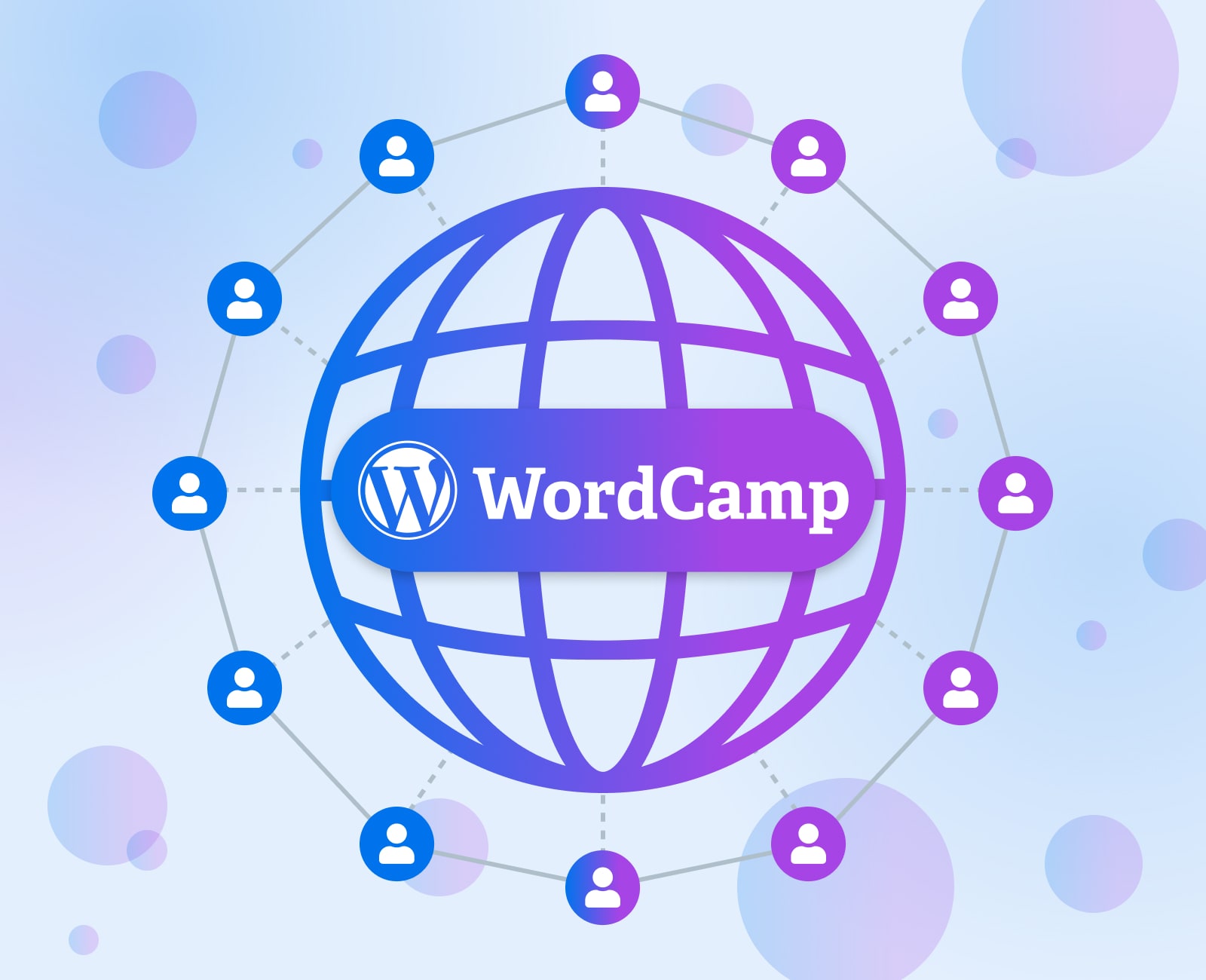
Other Opportunities
The fields listed above are just some of the many ways you can get involved as a WordPress contributor. For even more options, check out the main page of the Make WordPress website. You’ll find plenty of other groups looking for members, working on projects such as:
- Mobile: This team works on iOS and Android apps for WordPress and performs mobile device testing.
- Photos: This is the directory of publicly-contributed photos. This team moderates every single photo uploaded to the directory, as well as guiding photographers to help their photos get accepted.
- Support: If you have lots of experience with WordPress, you can help out the community by answering questions in the support forums and IRC channel.
- Training: This team focuses on creating lesson plans and educational materials for instructors to use.
3. Stay Involved In The WordPress Community
Just as it’s important to keep learning about WordPress while you’re working as a contributor, it’s also crucial to stay involved with the community. You’ve got to (digitally) mix and mingle! This will help to keep you updated about important news and events and makes it easier to find people to collaborate with and to get help from when you need it.
Even if you’re dedicated to a specific area of contribution, such as translation, it can be helpful to occasionally step outside that niche and talk to people involved in other parts of the project.
Meeting new people and encountering new ideas this way will help inform your own work and ensure that everyone is progressing toward the same goals. Here are a few ways to get — and stay — involved in the community:
- Continue to frequent your favorite research sources, especially forums and blogs.
- Stay up-to-date on WordPress news.
- Consider attending dedicated WordPress events, such as WordCamps and Meetups — This is a great way to meet people, share ideas, and start collaborations. If there aren’t any opportunities in your area, you can always start one yourself!
Becoming a WordPress contributor does take time and effort — but we think it’s well worth the investment. You’ll be part of a vast community of people all working towards a common goal, and you’ll have the chance to put your own stamp on the world’s most popular CMS.
Focus On Contributing, Let Us Handle The Rest
If you’ve only ever used WordPress to build your or other websites, it may surprise you to learn how much goes on behind the scenes.
A vast, thriving community is required to keep the platform at its best — including developers, designers, writers, and more. Getting involved in this community is simple and, in exchange, you’ll be met with plenty of opportunities for professional development and growth.
If you’re interested in being a WordPress contributor, you’re likely an active WordPress user. Which means working with a web host that fits seamlessly with WordPress is a top priority. DreamHost is dedicated to providing WordPress hosting that keeps your website online, secure, and speedy. Get back to focusing on the business you run and the contributions you love while you leave managed WordPress hosting in our hands.
WordPress + DreamHost
Our automatic updates and strong security defenses take server management off your hands so you can focus on creating a great website.



